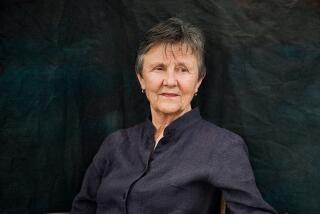Nelson Algren: Unappreciated genius of American literature
Nelson Algren may be my favorite unappreciated genius of American literature. His fiction, largely set in his hometown of Chicago, blends grit and sensitivity to portray the grifters and the scammers, the addicts and the down-and-outers, whose humanity we often overlook.
Between 1942 and 1956, he put together a run of five books â âNever Come Morning,â âThe Neon Wilderness,â âThe Man with the Golden Arm,â âChicago: City on the Makeâ and âA Walk on the Wild Sideâ â as good as anything any writer anywhere has ever done.
And yet, Algren, who died at 72 in 1981, has essentially been forgotten, his work unread, his name unrecalled.
âThe Man with the Golden Armâ may have won the first National Book Award for fiction, in 1949, but when I wrote about Algren five years ago on the centennial of his birth, I was told by Harold Augenbraum, executive director of the National Book Foundation, that plans for a national celebration had been scrapped because âthough his writing continued to resonate, the number of his readers and his currency among the general reading public had diminished.â
I donât know that any of this will change with the release of âAlgren: The Movie,â although the prospect is intriguing all the same. A documentary about the authorâs life, it premieres Tuesday at the Chicago International Film Festival â which is as it should be.
Featuring recordings of Algren, interviews with friends and admirers such as Russell Banks and Philip Kaufman and Art Shayâs iconic black and white photographs of the author, it promises to be a loving retrospective. For a taste, the filmmakers have released two trailers, one focusing on the personality and the other on the work.
Algren was a thorny character, thereâs no doubt about it. âHe was honest and irreverent,â director Michael Caplan told Chicagoist in 2009, âand maybe got under peopleâs skin.â
Caplan continues: âWhen he left Chicago for New Jersey in 1975 he certainly had no love for the city. He felt it had rejected him, failed to recognize his work. Plus by the end of his life he was pretty bitter and drinking a lot. But I donât wish to focus on that with this movie. I want to show that ultimately he was a compassionate man who loved people, especially the underdogs.â
The key to Algren, of course, is the tension between those perspectives: bitterness and compassion like a kind of yin and yang.
âThe great trains howling from track to track all night,â he writes in âNever Come Morning.â âThe taut and telegraphic murmur of ten thousand city wires, drawn most cruelly against a city sky. The rush of city waters, beneath the city streets. The passionate passing of the nightâs last El.â
It makes me think of Bruno Bicek, the tough guy at the center of that novel, or Frankie Machine, junkie hero of âThe Man with the Golden Armâ â âthe luckless living soon to become the luckless dead.â
These were Algrenâs people; he identified with them, as both a writer and a human being.
âI donât think the isolation of the American writer is a tradition,â he told the Paris Review in 1955; âitâs more that geographically he just is isolated, unless he happens to live in New York City. But I donât suppose thereâs a small town around the country that doesnât have a writer. The thing is that here you get to be a writer differently. I mean, a writer like Sartre decides, like any professional man, when heâs fifteen, sixteen years old, that instead of being a doctor heâs going to be a writer. And he absorbs the French tradition and proceeds from there. Well, here you get to be a writer when thereâs absolutely nothing else you can do. I mean, I donât know of any writers here who just started out to be writers, and then became writers. They just happen to fall into it.â
Twitter: @davidulin
More to Read
Sign up for our Book Club newsletter
Get the latest news, events and more from the Los Angeles Times Book Club, and help us get L.A. reading and talking.
You may occasionally receive promotional content from the Los Angeles Times.









